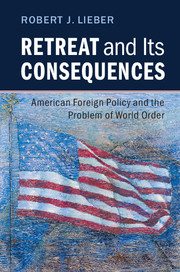Book contents
- Frontmatter
- Dedication
- Contents
- List of figures and tables
- Acknowledgments
- Introduction
- 1 Foreign policy retreat and the problem of world order
- 2 Burden sharing with Europe: problems of capability and will
- 3 Middle East policy: regional conflicts and threats to national interest
- 4 BRICS: stakeholders or free-riders?
- 5 Retreat and its consequences
- 6 Can America still lead – and should it?
- Index
1 - Foreign policy retreat and the problem of world order
Published online by Cambridge University Press: 05 May 2016
- Frontmatter
- Dedication
- Contents
- List of figures and tables
- Acknowledgments
- Introduction
- 1 Foreign policy retreat and the problem of world order
- 2 Burden sharing with Europe: problems of capability and will
- 3 Middle East policy: regional conflicts and threats to national interest
- 4 BRICS: stakeholders or free-riders?
- 5 Retreat and its consequences
- 6 Can America still lead – and should it?
- Index
Summary
Looking back over my more than half a century in intelligence, I have not experienced a time when we have been beset by more crises and threats around the globe.
– James R. Clapper, Director of National IntelligenceDuring the last half of the twentieth century and the early years of the twenty-first, the United States was the preeminent power and leading actor in world affairs. This role took many forms: allied leader of the Big Three powers in World War II, creator and sustainer of international institutions and the postwar international order, head of the Western alliance during the Cold War, and lone superpower in the post–Cold War era. In those years, America supported regional stability, provided deterrence and reassurance for allies, led efforts at nonproliferation, underwrote much of the world economy, fostered trade liberalization, and often (though not always) encouraged human rights and democratization. In doing so, it served, in effect, as the world's leading provider of public goods.
In recent years, however, America's status and role have undergone a pronounced change. In the years after the 9/11 terrorist attacks on New York and Washington, the United States experienced long and costly wars in Iraq and Afghanistan, the 2008–9 global financial crisis, and the Great Recession. The international arena has also changed. Foreign policy now takes place in an increasingly globalized world in which power has become much more diffused than was the case during the Cold War (1945–91) and in the initial decade of the post–Cold War era. Simultaneously, the BRICS (Brazil, Russia, India, China, and South Africa) and others have seemingly emerged as significant actors in world affairs. The appearance of these and other rising powers is not entirely new, but together they represent an increased presence in economic, cultural, political, and even security terms, and some authors describe their rise as altering the international balance of power, marking an end to the postwar American order.
At the same time, the relative influence of America's longtime allies, Europe and Japan, has ebbed as these traditional centers of power have seen economic and demographic stagnation and increasing political disarray.
- Type
- Chapter
- Information
- Retreat and its ConsequencesAmerican Foreign Policy and the Problem of World Order, pp. 6 - 16Publisher: Cambridge University PressPrint publication year: 2016



